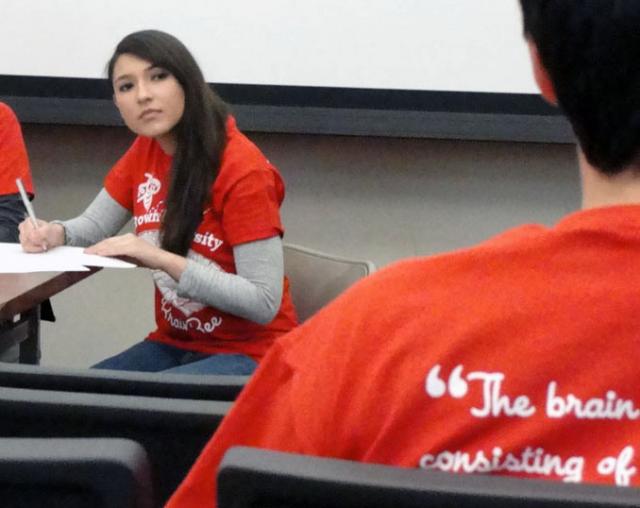PROVIDENCE, R.I. [Brown University] — When neuroscience concentrator Tara Torabi was a senior at Granville High School in Ohio in 2011, she won the Denison University Brain Bee. She went on to represent Ohio at the national neuroscience contest in Baltimore, but there she faced no one from Rhode Island because the state had no bee.
Now, thanks to Torabi, a junior at Brown, it does. For the last two years she has organized the Brown Brain Bee for Rhode Island teens. At the 2014 bee Feb. 8, 2014, East Cranston junior Ellen Macaruso prevailed to earn the right to head to Baltimore next month. The winner there will represent the United States in the International Brain Bee.
Macaruso, who said she studied a lot in her free time and was glad to have learned so much, led the field with 48 of 60 possible points from questions covering neurotransmitters, neurological disorders, and brain anatomy. Her victory remained unannounced, however, until fellow Cranston East students Cris Carmela Sena and Roxie Parra resolved their second-place tie at 42 with a playoff. (Sena won.)

For love of the brain
Torabi worked hard when she competed in the Ohio bee too. In her two years of competition she had the encouragement of her science teacher and the competition’s organizers at Denison (conveniently located in her hometown), but she taught herself all the material from the contest’s official downloadable textbook, Brain Facts.
Torabi’s studious participation — added to that year’s stress of applying to an Ivy League school — turned out to be a labor of love. Through the bee, she became enamored with studying the brain.
“Understanding neuroscience allows you to understand yourself in a way that nothing else can,” she said. “The brain is an amazing organ. People are so engrossed by technology and how many features the latest edition of a smartphone has, but they don’t realize that we are already equipped with machinery in our heads that is so powerful.”
So smitten was she with brain science that she began to read books by famed neurologist Oliver Sacks before bed. She committed to studying neuroscience in college. That’s why she chose Brown.
Making the Bee be
Torabi could have come to Rhode Island and never expressed more than a passive lament that the competition didn’t exist here. But she’s enthusiastic about inspiring kids to develop academic ambitions. She also serves as an Americorps Access Scholar with the Brown College Advising Corps at the Swearer Center. Former Swearer Center staffer Ralph Johnson encouraged Torabi to apply to Americorps and mentored her last year when she was first striving to make the bee take flight.
Torabi has the sense that brain science is gaining prominence. Not only does Rhode Island have the Brown neuroscience program that brought her here, but new institutes at Rhode Island Hospital and the University of Rhode Island have added to the state’s efforts in the field. Meanwhile, President Obama launched the $100 million BRAIN Initiative at the White House last year.
“Providence is becoming this great place for neuroscience research,” she said. “It’s really wonderful that we’re doing all this brain research but ultimately with that focus we also need to focus on how to make science more accessible to the public. It’s important that we share this knowledge with high school students in Rhode Island.”
This fall and winter in their Saturday classes, students held real brains, took a field trip to the Bradley Hospital’s sleep laboratory, and experimented with sensory receptors on their tongues by consuming “miracle berries,” which alter perception so sour flavors taste sweet. Helping her teach were senior Claudine Yee, classmates Rudy Chen, Ronak Jani, Kishan Patel, and Norbert Promagan, sophomores Reem Abdel-Haq and Elina Pliakos, freshmen Sahana Nazeer and Carin Papendorp, and graduate students Michelle Fogerson and Lauren Quattrochi.
John Stein, senior lecturer in neuroscience, hosted the Bee on Saturday. Three judges — Robert Patrick, associate professor of neuroscience, and graduate students Torrey Truszkowski and Rachel Stevenson — read the questions, organized by difficulty (10 easy ones for one point each, 10 medium ones for two points, and 10 hard ones for three points). Contestants had 30 seconds to write their answers on small whiteboards (a la Final Jeopardy). The judges certified correct answers and the contestants accumulated their points.
In the end, Macaruso took home not only a trophy but also a $200 prize (Sena got $125 and Parra received $75). The prize money and support for the classes came from the Bee’s sponsors, the Department of Neuroscience, the Department of Cognitive, Linguistic, and Psychological Sciences, the Division of Biology and Medicine, the Norman Prince Neurosciences Institute, and Brown Student Agencies.
No one can be sure whether any of the teen contestants will become future neurologists, neurosurgeons or researchers, but Torabi created a cadre of uncommonly well-informed high-school students and motivated them to devote a string of Saturdays to a subject rarely ever studied by kids their age. Her efforts fulfilled a fundamental mission of University life.
“Knowledge is not useful unless you share it with others,” Torabi said.
